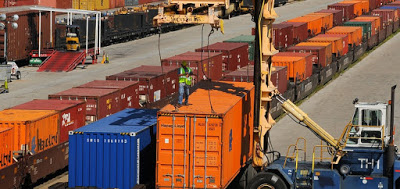Dive
Brief:
Brief:
- Just after the House Appropriations Committee
released its Fiscal Year 2019 Transportation, Housing and Urban Development
Funding bill that sets aside $250
million for port projects, the American Association of Port Authorities
released its State of Freight III report reiterating
ports’ need for infrastructure funding.
- The report laments that “only $1.13 billion
[of the FAST Act] was eligible for multimodal projects” and
“this amount has already dwindled to $275 million after several
rounds of FASTLANE and Infra Grants have been awarded.” - The report claims ports need $20 billion for rail
and multimodal projects over the next 10 years. It said 77% of ports are
planning to improve rail access over the next decade to meet increasing
demand and 67% consider funding and financing to be the top barrier to
completing these projects.
Dive
Insight:
Insight:
Congress
and port authorities aren’t on the same page about
how much funding ports need to operate at optimal efficiency.
and port authorities aren’t on the same page about
how much funding ports need to operate at optimal efficiency.
Because
repairing roads and highways are such a top priority for Congress right now, ports
may have an uphill battle to get the funding they want.
repairing roads and highways are such a top priority for Congress right now, ports
may have an uphill battle to get the funding they want.
Ports
want better funding and financing options, and while there are funding and
financing options available — like the Railroad Rehabilitation &
Improvement Financing Program (RRIF) — the State of
Freight report said ports find the application process for such programs
“frustrating” and want 100% financing.
want better funding and financing options, and while there are funding and
financing options available — like the Railroad Rehabilitation &
Improvement Financing Program (RRIF) — the State of
Freight report said ports find the application process for such programs
“frustrating” and want 100% financing.
Ports
have been struggling with funding since
the Great Recession, and the rise of e-commerce and its effects on shipping and
supply chains have forced them to change rapidly, far faster than they can keep
up when it comes to restructuring.
have been struggling with funding since
the Great Recession, and the rise of e-commerce and its effects on shipping and
supply chains have forced them to change rapidly, far faster than they can keep
up when it comes to restructuring.
SupplyChain Dive

































































